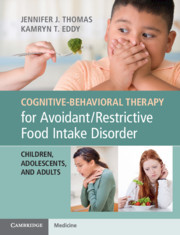Cognitive-Behavioral Therapy for Avoidant/Restrictive Food Intake Disorder Children, Adolescents, and Adults
Langue : Anglais
Auteurs : Thomas Jennifer J., Eddy Kamryn T.

This book outlines a new cognitive-behavioral treatment for patients of all age groups with avoidant/restrictive food intake disorder.
Avoidant/restrictive food intake disorder (ARFID) is a common eating disorder diagnosis that describes children and adults who cannot meet their nutritional needs, typically because of sensory sensitivity, fear of adverse consequences and/or apparent lack of interest in eating or food. This book is the first of its kind to offer a specialist treatment, specifically for ARFID. Developed, refined and studied in response to this urgent clinical need, this book outlines a specialiZed cognitive-behavioral treatment: Cognitive-Behavioral Therapy for Avoidant/Restrictive Food Intake Disorder (CBT-AR). This treatment is designed for patients across all age groups, supported by real-life case examples and tools to allow clinicians to apply this new treatment in their own clinical settings.
Dedication; List of figures; List of tables; Foreword; Preface; Acknowledgements; 1. What is ARFID?; 2. Overview of existing treatments for feeding, eating, and anxiety disorders; 3. Assessment of ARFID; 4. Cognitive-behavioral model of ARFID; 5. Overview of CBT-AR; 6. Stage 1: Psychoeducation and early change; 7. Stage 2: treatment planning; 8. Stage 3: maintaining mechanisms in order of priority; 9. Stage 4: relapse prevention; 10. CBT-AR case examples; 11. Conclusion and future directions; Appendix 1: CBT-AR competence ratings; Appendix 2: CBT-AR adherence: session-by-session ratings; References; Index.
Jennifer Thomas is Co-director of the Eating Disorders Clinical and Research Program at Massachusetts General Hospital, and an Associate Professor of Psychology in the Department of Psychiatry at Harvard Medical School.
Kamryn Eddy is Co-director of the Eating Disorders Clinical and Research Program at Massachusetts General Hospital, and an Associate Professor of Psychology in the Department of Psychiatry at Harvard Medical School.
Kamryn Eddy is Co-director of the Eating Disorders Clinical and Research Program at Massachusetts General Hospital, and an Associate Professor of Psychology in the Department of Psychiatry at Harvard Medical School.
Date de parution : 11-2018
Ouvrage de 190 p.
18.9x24.6 cm
Thème de Cognitive-Behavioral Therapy for Avoidant/Restrictive... :
© 2024 LAVOISIER S.A.S.



